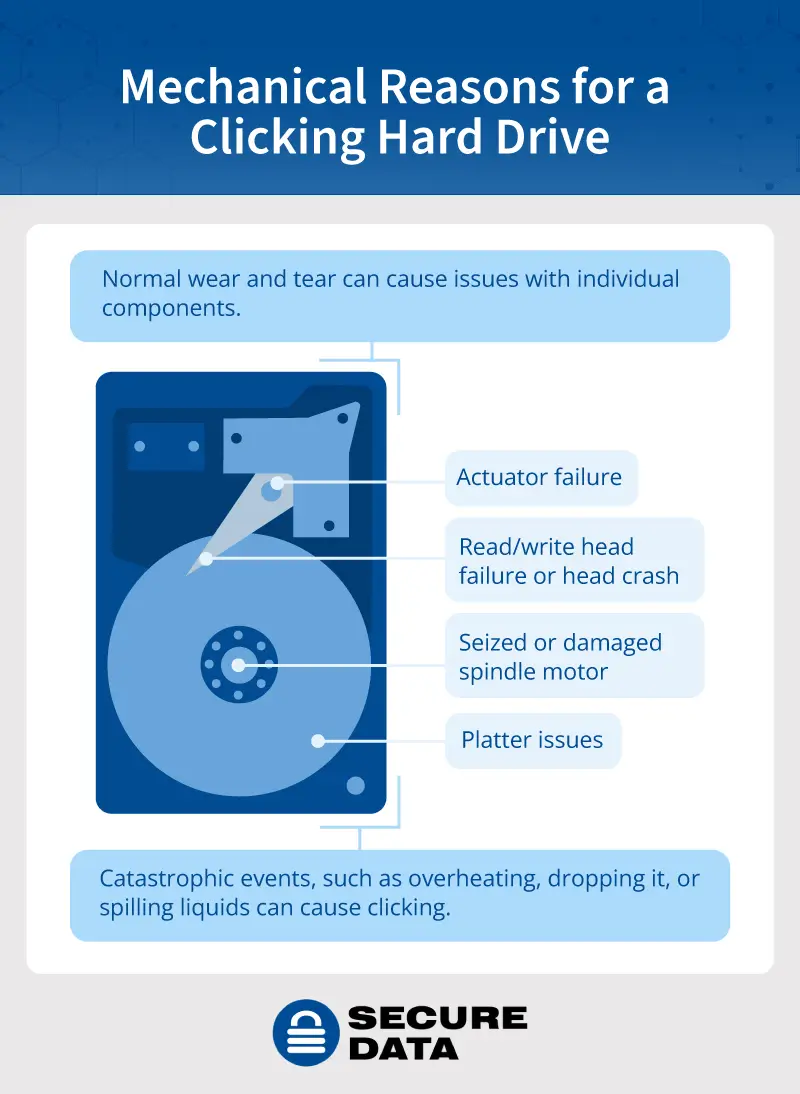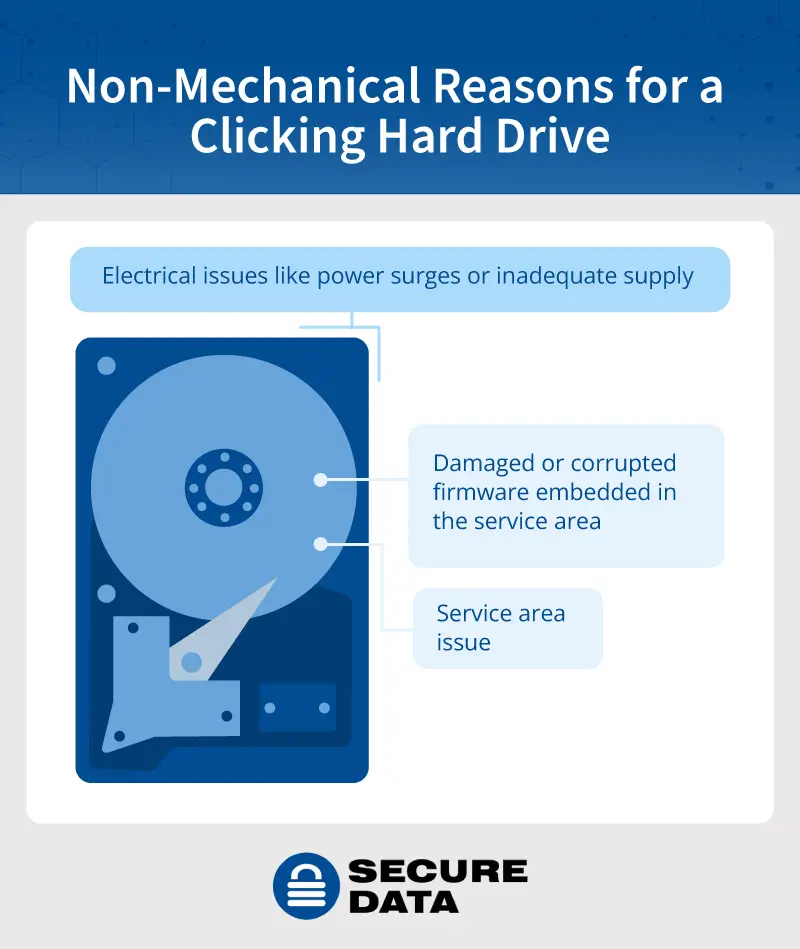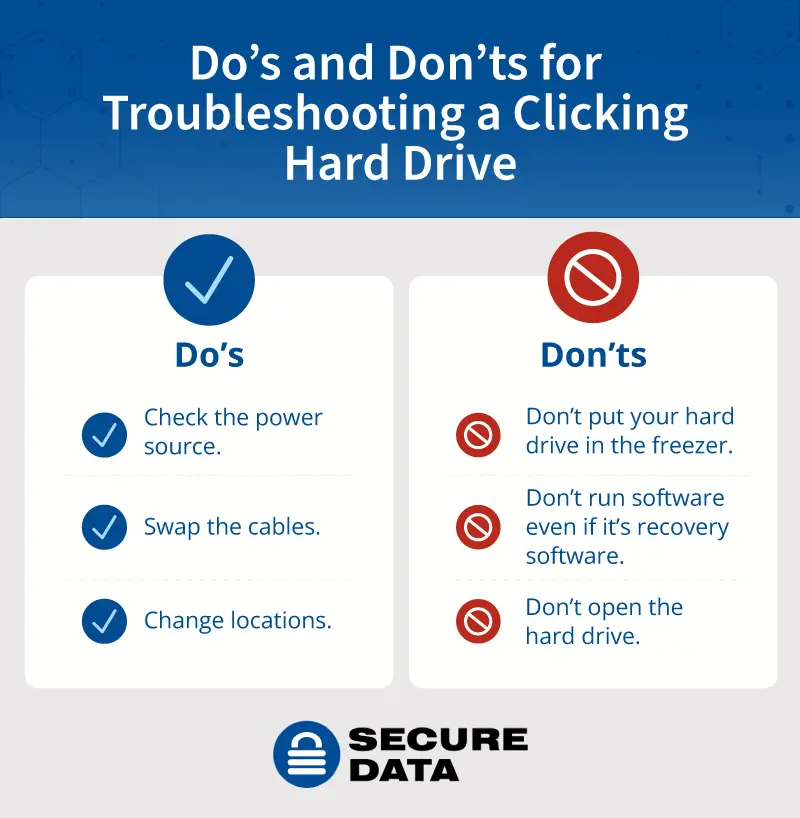You might be hearing some weird clicking noises when using your PC, laptop, or external hard drive. Unlike the rhythmic, soft clicking or beeping noises when your hard drive is working normally, these noises will sound like harsh and loud metal-on-metal clicking. Known as the “click of death,” these noises can be a sign of your hard drive failing, which could lead to potential data loss.
Whether it’s internal or an external drive, a hard disk drive (HDD) includes a disc with a magnetic coating that stores information in binary numbers. A storage device that can both save and retrieve data, even one failure can compromise your hard drive and data and require internal or external hard drive recovery services.
If you have a clicking hard drive, this post explains the causes of the sound, what that means for your hard drive, and how to recover the data stored there.
Failing Hard Drive Noises
These audio files will help you determine if the noise coming from your hard drive is cause for concern. If your hard drive sounds like these examples, it’s time to consult a professional.
Mechanical Reasons for a Clicking Hard Drive
The hard drive is made up of several components, and any of them malfunctioning can cause your hard drive to click. Below, we list the various mechanical issues that can affect your hard drive.
Because data storage is vital on your device, it’s always best to have the diagnosis done by a pro experienced in hard drive repair, but the following can help you narrow down the issue.
Platter Issues
The platter is a hard disc, coated in a thin layer of magnetic material. The actuator and head stack move the head to either read or write the data via a current and magnetic field. It can do this without physically touching the platter, which is spinning at high speeds.
Hard drives can have multiple platters. Should the hard drive’s platters be damaged in any way, the actuator arms will continue searching for data but to no avail, causing a clicking sound as it goes back and forth.
Stuck (Seized) or Damaged Spindle Motor
The spindle motor spins the platter around, allowing the read/write head to function. If the motor is damaged, the platter will spin slower or not at all. This will cause a buzzing or erratic whirring noise that sounds somewhat like clicking.
Read/write Head Failure or Head Crash
The read/write head moves across the platter to access and modify the data that is stored on the drive. When the head comes into contact with the platter, it’s considered a head crash which can create a clicking sound. However, if it cannot function correctly, the disk head will try to reposition, which can also lead to a clicking noise as it moves back and forth.
Actuator Failure
The actuator arm moves the read/write head across the platter. It precisely positions the head over the platter, allowing it to read or write information. If the actuator fails, the read/write head gets stuck and can’t access or write data correctly, which can cause clicking noises as the arm moves back and forth.
Mechanical Issues Due to Normal Wear and Tear
Hard drives should last about seven years, so even if everything works fine up until that point, some components may fail due to age or normal wear and tear. Any of the hard drive parts that encounter issues will cause it to not function properly, leading to the clicking noises.
Catastrophic Failure
If you drop your device, overheat it, damage it with liquid, or experience anything catastrophic with it, you could damage the components on the hard drive. This damage can cause failures described above and will result in irregular clicking sounds as your hard drive tries to do its job despite the physical damage.
Non-Mechanical Reasons for a Clicking Hard Drive
Your hard drive may fail due to non-mechanical issues as well. As mentioned before, use this list to help you differentiate between mechanical and non-mechanical issues you may be facing. Always leave the actual diagnosis and repair for a professional.
Firmware Issue
Hard drives work like little computers inside of your device. They boot up a firmware program for your HDD that works a lot like an operating system. Firmware directs how your hard drive is supposed to act. It has its own motherboard, called the printed circuit board (PCB), and code stored on your HDD’s memory.
Since firmware is the brains of the hard drive, any issues with the firmware will cause issues with the hard drive. The read/write heads will try to access data and will not find it, causing the clicking noise. Firmware updates and DIY fixes won’t solve this problem, and since firmware is necessary for data access, you will have to get your data recovered by pros.
Service Area Issue
Every hard drive has a special place, called the service area, that stores system files, error correction codes, and other critical data. This keeps the drive operating and functioning normally. Should anything become corrupted in this area, the hard drive won’t be able to function and you’ll hear clicking sounds.
Electrical Issues
Power is another source that can affect your hard drive. Electricity surges, inadequate power supply, or anything negative related to the power could cause your hard drive to click. If you suspect insufficient power is an issue, you can troubleshoot this by using an alternative power source to see if it resolves the clicking.
Troubleshooting a Clicking Hard Drive
Troubleshooting can help you narrow down the root cause and see if the clicking is indeed the result of a failing hard drive. Troubleshooting will not fix your drive or help you access data. You should only allow professionals with years of experience to repair the hard drive or provide hard drive recovery services.
- Check the power source. Power sources are a common cause of clicking noises in hard drives. Try to plug your device into another source. If the clicking stops, you’ll know it was because of the power and not because of the hard drive failing.
- Swap the cables. Cables can get damaged, so faulty cables could cause your hard drive not to run properly. Swapping the cables out can help you determine whether the power cables are bad or your hard drive is the issue, just like with power sources. If the clicking sound continues after you’ve changed cables, you’ll know the issue is with your hard drive.
- Change locations. If your hard drive isn’t on a flat surface or if the fan is obstructed, it could impact the performance of your hard drive. A quiet room could make noises more pronounced, too, so see if a different location changes the noise you’re hearing. If not, the hard drive is the issue.
Avoid These DIY Fixes for Your Clicking Hard Drive
Unfortunately, there is no way to fix the hard drive by yourself. You should leave this up to the professionals, as trying to fix it on your own could lead to catastrophic data loss. The following list explains DIY fixes you should not do and details just how those attempts could damage your HDD and your data:
- Don’t put it in the freezer. People believe that putting the device in the freezer could stop static friction. Unfortunately, it can corrode your hard drive thanks to the water vapour inside and cause even more damage.
- Don’t run software — even recovery software. Data recovery software cannot recover data, and it will harm the hard drive even more. It could potentially jeopardise your data and leave it completely unrecoverable, even for professionals.
- Don’t open the hard drive. Lubricating or adjusting the hard drive yourself might seem like a great idea, but you may expose it to dust and misalign read and write heads with even the slightest touch. You need a clean room and professional knowledge to properly diagnose, calibrate, and fix the issue.
How to fix a clicking hard drive
Hard drives never fail at a convenient drive, and they’re not convenient to fix either. You shouldn’t try to fix them on your own, but there is a solution. Experienced professionals are best equipped to fix mechanical failures. These pros can open the hard drive in a clean space and align these carefully calibrated components in a way that fixes the issue, not harming the hard drive even more.
Repairs can be expensive, and when looking at the options, you might decide that a new hard drive is the best way to go. However, if you have data on the damaged hard drive that you need, you should look into data recovery services. Out of all the hard drive recovery cases received in 2023, over 80% were for mechanical issues in hard drives. These failures take a little over 5 and a half hours for a data recovery specialist to fix, recovering your data seamlessly.
Data recovery for a clicking hard drive
Hard drive failure can be so frustrating, as it leaves you with no data and a useless device, but that doesn’t mean your data is lost forever. You can use our data recovery services if you need to access the data on a clicking hard drive. Get a free quote today! We promise that if we can’t recover your data, we won’t charge you for our services.


















